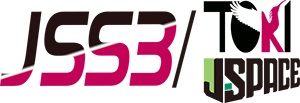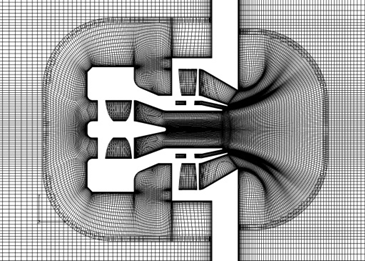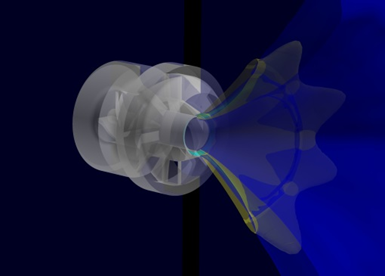Development of CFD technology to support design of aircraft combustor with real configuration
JAXA Supercomputer System Annual Report April 2016-March 2017
Report Number: R16E0021
- Responsible Representative: Hisao Futamura(Aeronautical Technology Directorate, Propulsion Research Unit)
- Contact Information: Mitsumasa Makida(makida@chofu.jaxa.jp)
- Members: Mitsumasa Makida, Naoki Nakamura
- Subject Category: Basic Research(Design technique)
Abstract
For the development of combustors with practically complicated configuration which consist of many parts, it is important to develop CFD technologies to conduct many parametric studies effectively by changing parameters for configurations. In this research, we utilize a multi-block structured grid solver, which conduct large scale cold-flow simulation inside combustors with real complicated configurations, as a base solver, and integrate various spray and combustion models, aiming to obtain design methods for development of aircraft combustors, which estimate dispersion of the fuel droplets, evaporation, and combustion processes.
Goal
In this research, we aim to obtain design methods for development of aircraft combustors with real configuration, which estimate dispersion of the fuel droplets, evaporation, and combustion processes.
Objective
Through development of combustors with real configuration, we have been developed a multi-block structured grid solver for large scale cold-flow simulation inside combustors with real complicated configurations. In this research, we utilize this code as a base solver, and integrate various spray and combustion models, aiming to obtain design methods for development of aircraft combustors, which estimate dispersion of the fuel droplets, evaporation, and combustion processes.
References and Links
N/A
Use of the Supercomputer
It is important to do parametric case study with slightly different geometry, and each case needs large scale simulation. To conduct such simulation and visualization effectively, we use the super computer with high parallelization efficiency.
Necessity of the Supercomputer
It is important to do parametric case study with slightly different geometry, and each case needs large scale simulation. To conduct such simulation effectively, we need the super computer with high parallelization efficiency.
Achievements of the Year
In this fiscal year, we integrate a spray model into the base solver, which enabled to simulate spray dispersion from a fuel nozzle with realistically complicated configuration.
Publications
Peer-reviewed articles
1) Mitsumasa MAKIDA , Yoji KUROSAWA , Hideshi YAMADA , Kazuo SHIMODAIRA, and Seiji YOSHIDA, Naoki NAKAMURA, A. Koichi HAYASHI, ‘Emission Characteristics through Development Process of Rich-Lean Combustor for Small Aircraft Engine,’ J. of PROPULSION AND POWER, Vol. 32, No. 6, November-December 2016.
Computational Information
- Parallelization Methods: Hybrid Parallelization
- Process Parallelization Methods: MPI
- Thread Parallelization Methods: Automatic Parallelization
- Number of Processes: 120
- Number of Threads per Process: 8
- Number of Nodes Used: 30
- Elapsed Time per Case (Hours): 300
- Number of Cases: 20
Resources Used
Total Amount of Virtual Cost(Yen): 3,961,104
Breakdown List by Resources
| System Name | Amount of Core Time(core x hours) | Virtual Cost(Yen) |
|---|---|---|
| SORA-MA | 2,408,216.81 | 3,923,416 |
| SORA-PP | 2,614.21 | 22,320 |
| SORA-LM | 1.13 | 25 |
| SORA-TPP | 0.00 | 0 |
| File System Name | Storage assigned(GiB) | Virtual Cost(Yen) |
|---|---|---|
| /home | 15.24 | 143 |
| /data | 1,006.72 | 9,496 |
| /ltmp | 604.54 | 5,702 |
| Archiving System Name | Storage used(TiB) | Virtual Cost(Yen) |
|---|---|---|
| J-SPACE | 0.00 | 0 |
Note: Virtual Cost=amount of cost, using the unit price list of JAXA Facility Utilization program(2016)
JAXA Supercomputer System Annual Report April 2016-March 2017




